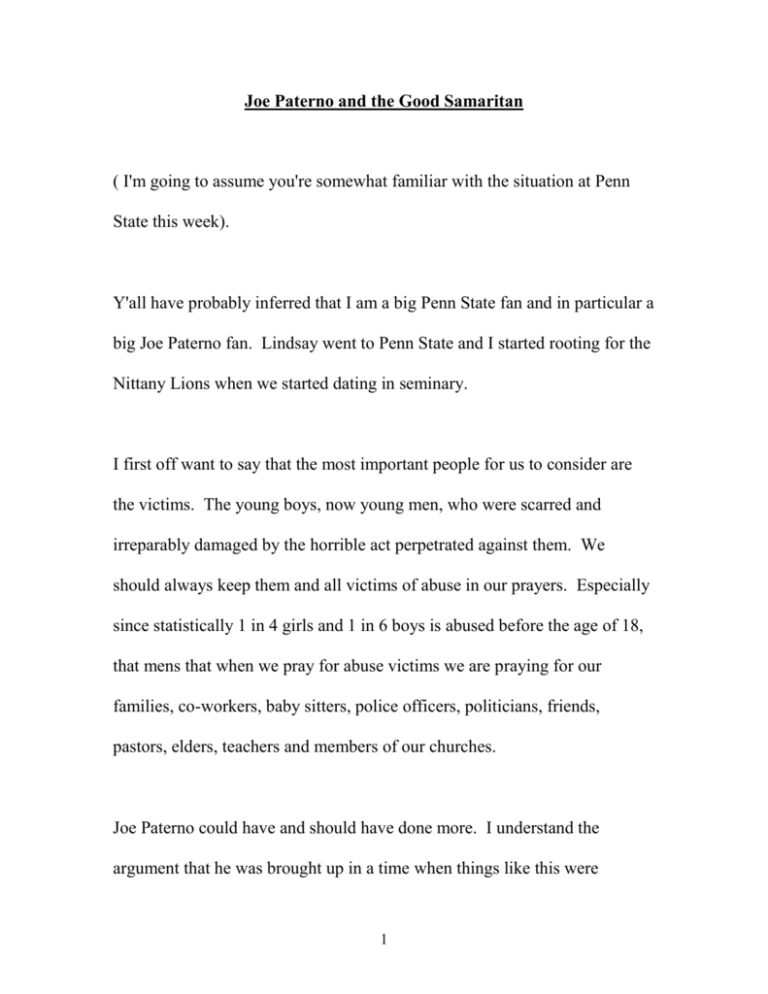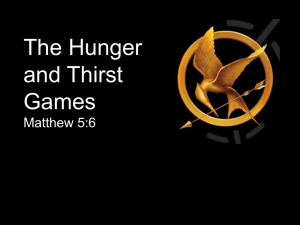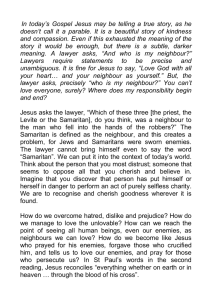
Joe Paterno and the Good Samaritan
( I'm going to assume you're somewhat familiar with the situation at Penn
State this week).
Y'all have probably inferred that I am a big Penn State fan and in particular a
big Joe Paterno fan. Lindsay went to Penn State and I started rooting for the
Nittany Lions when we started dating in seminary.
I first off want to say that the most important people for us to consider are
the victims. The young boys, now young men, who were scarred and
irreparably damaged by the horrible act perpetrated against them. We
should always keep them and all victims of abuse in our prayers. Especially
since statistically 1 in 4 girls and 1 in 6 boys is abused before the age of 18,
that mens that when we pray for abuse victims we are praying for our
families, co-workers, baby sitters, police officers, politicians, friends,
pastors, elders, teachers and members of our churches.
Joe Paterno could have and should have done more. I understand the
argument that he was brought up in a time when things like this were
1
handled behind closed doors. I understand the argument that he was taking
the word of a 22 year old graduate assistant who wasn't specific against a
friend and colleague whom he had trusted and worked with for decades. He
could have and should have done more.
When we think of the story of the Good Samaritan, we often contrast the
roles of the Levite and priest with the Samaritan. We say that the Samaritan
was the neighbor because he helped the victim instead of ignoring the victim
and we conclude that we should be like the Samaritan and not like the Levite
or the priest. More often than not, we are the Levite and the priest walking
by saying, "At least I'm not the thief." We demonize others so that we don't
have to face our own shortcomings or take responsibility for our inaction.
We point at Paterno and Spanier (the University President) and Curley (the
athletic director) because we don't want to face the fact that we are not all
that different. We demonize them because we don't want to admit that we
all ignore sin, that we all look the other way, that we all don't protect the
innocent and we all turn a blind eye.
This morning there were a group of young men smoking pot on our
basketball court at church. It smelled like it, I could see it, they were rolling
2
it. I went out and said, "I don't know what you're smoking; I don't care what
you're smoking; you can't smoke anything on this property." I turned a blind
eye. I knew what they were smoking, but I didn't call them on it. I was a
Levite walking by saying "At least I'm not the thief."
How often do we turn a blind eye to the famine and AIDS epidemic in
Africa? How often do we turn a blind eye to the sex slave trade in the
United States (the center of the sex slave trade in North America is Kansas
City. Bet you didn't know that.)? How often do we turn a blind eye to the
poor, the addicted, the depressed? How often do we purposely avoid
Lancaster Avenue because it's "the bad part of the town?" We are all
Levites and priests walking by saying, "At least I'm not the thief."
The truth with sexual abuse is that we all turn a blind eye. Given how
prevalent and how rampant it is, especially in churches (almost every church
I know of has had some history of sexual abuse in its past), it's incredible
how rarely it comes up when we talk about the history of the church. We
can talk about the pastor who stole money, who ran away with the Sunday
School teacher, or who showed up to the pulpit drunk, but we, as a society,
have gotten into the habit of ignoring sexual abuse, burying it, and keeping it
3
quiet. How many different people in this particular story had a chance to say
something? The multiple levels of the administration at the university and
athletic department, people from the charity, victims, parents, other kids.
We demonize because we don't want to admit that it takes a whole town of
people keeping quiet and we are part of that town. In truth, if a scared 22
year old kid came to us and made a vague reference that our friend of
decades was doing something inappropriate with a kid in the shower, we
would probably kick it up the chain of command so as to not have to deal
with it. We all keep secrets, we all turn a blind eye, we all fail the
innocent...and none of us want to admit it. We are the Levites walking by
saying, "At least I'm not the thief." We all can and should do more.
.
Whenever the topic of sexual abuse, especially against minors, comes up, I
am always surprised by the intense anger, hatred, and vitriol spouted against
abusers and anyone tangentially associated. Now don't get me wrong, I have
no tolerance for those in power taking advantage of people out of power to
their harm. It is inexcusable, unthinkable, and despicable. Sandusky, should
the allegations be true, should be prosecuted to the full extent of the law.
4
However, when I read things like "I hope there's a special circle of hell
reserved for these people" published by writers in a national magazine
(ESPN.com in this case) I can't believe my eyes. Is this really how Jesus
taught us or showed us how to treat one another? When Jesus said, "Love
your enemies and pray for those who persecute you" (Mat 5:44) is this what
he meant? When Jesus said, "Forgive them father, for they know not what
they do" (Luke 23:34) is this the example he was setting? That we would
rather see someone eternally tortured than see them redeemed by Jesus
Christ?
I think we demonize and dehumanize him, saying he is pure evil because we
don't want to believe that good people could do such terrible things. We
don't want to believe that 1 in 4 girls and 1 in 6 boys are abused. We don't
want to believe that our friends, and neighbors, and co-workers and even our
children are victims of abuse and in many cases perpetrators of sexual
impropriety (ranging from pornography use to assualt to prostitution to
pedophelia) (and yes, children are often perpetrators). It's much easier to
compartmentalize and imagine that "If we could only lock up all the people
who do this or turn a blind eye to this..." than it is to face the reality that
5
sexual impropriety is a systematic problem that pervades every aspect of
society.
I think the reason why this is the case is because of the secrecy that
surrounds sexual abuse. SO many of us have been hurt by sexual abuse (as a
victim, as a friend of a victim, or even as a perpetrator) but have not found a
healthy way to come to terms with it. The only thing we know how to do is
to be angry. And we bottle that anger up inside for years and decades so that
when we finally get a chance to express any feelings on the subject at all
(like when it's in the public eye) we take all the anger that we've built up
over decades and unleash on the nearest target, in this case Sandusky. We
demonize, dehumanize, and vilify him because he is the stand in for the
years of un-dealt with pain, hurt, shame, and anger that we've been carrying
around. We've turned a blind eye to our own pain and the only way we
know how to deal with it is to project it onto other situations. We have
never figured out a way to deal with it in a way that brings healing, closure,
reconciliation, and ultimately redemption and so the next generation of
victims is even more afraid of disclosing what happened, fearing they might
be somehow implicated and the next generation of perpetrators is even more
afraid of seeking help, fearing our backlash.
6
In truth, in the story of the Good Samaritan, we are not Levites. We are not
the Good Samaritan. We are not even the thieves. In the story of the Good
Samaritan, we are the man on the side of the road. We have been hurt. We
have been hurt by people who should have been there but weren't. We have
been hurt by people we trusted but violated our trust. We have been hurt by
people who took advantage of us and people who turned a blind eye. We
have been hurt by our parents, our teachers, our peers, our pastors, our
church leaders, our friends, and we have been hurt by ourselves. We have
been beaten and robbed by thieves and we have watched priests and Levites
turn a blind eye. And we wait...and wait...and wait....for someone to stop
and love us. And while we wait we grow more angry, more bitter, more
hateful...and more hurt. So who is the Good Samaritan?
Jesus.
Jesus is the one who has not turned a blind eye. Jesus is the one who knows
what it is to be beaten, to be robbed, to be mocked, to be betrayed, to be left
for dead. Jesus knows what it is to have a blind eye turned. Jesus knows
what it is to hurt. And yet, Jesus, knowing the consequence of his actions,
7
still stops for us. Jesus, knowing the priests and Levites will crucify him for
stopping when they would not, still comes and bandages us, sets us on his
donkey, takes us to the inn, pays for our room and meal, and promises that
he will return and pay for everything that we owe. And Jesus does the same
for the priest, the Levite, and yes, even the thief.
Jesus' promise of justice is not that the evil will be purged from creation.
Jesus' promise is that evil will be redeemed. Not that the Sandusky's of the
world will be punished, but that the Sandusky's of the world will be
transformed. Not that the victims of the world will be avenged, but the the
victims of the world will be reconciled. Jesus' promise is that we will one
day find a place or build a place where we can share our secrets and not be
shamed, judged, or condemned. Jesus' promise is not that the thief, the
priest, and Levite will be robbed and beaten, but that all four characters - the
thief, the priest, the Levite and the man by the road will all be healed.
8









